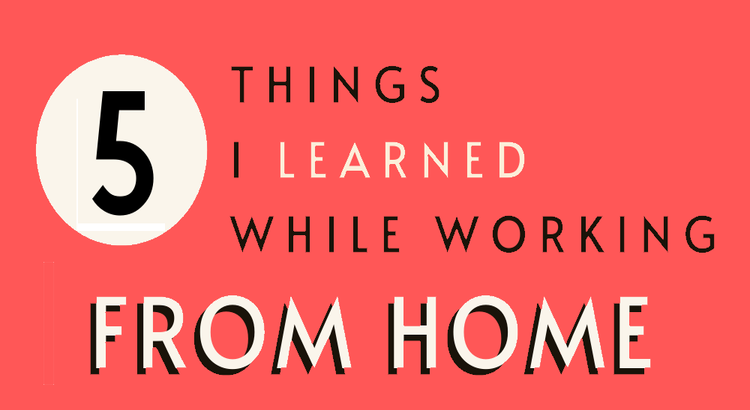Working from home is often touted as the ultimate goal for office workers. Working from home allows you to avoid the brutal morning commute, set your own schedule and generally enjoy your life more. And since you’re in such a positive environment you’re also happier and maybe rage at your family less. What isn’t often reported, however, is that it can actually be pretty difficult to transition to working from home.
Like many Americans now forced to avoid public places due to the rapid spread of COVID-19, my wife and I have started working from home. While I am grateful that we are still employed at a time when millions of Americans are filing for unemployment, I didn’t realize how difficult the transition would be, or how unprepared I was to work from home.
Here are the 5 most important lessons I gleaned working from home.
1. Maintaining a Routine Is Crucial
Though I have worked from home a lot over the years, the type of projects I undertake from home don’t really feel like work. It’s stuff I love to do, and from time to time am fortunate enough to be compensated for. However, the majority of my income comes from a typical office job in an investment banking environment. Even now, I need to be physically present in the office for at least a few hours a day in order to approve and print checks for client investments. It was only when I started doing the majority of my work from home that I realized how important my old routine was to me.
Getting up at 6 AM, day after day, to shower and get dressed, brew coffee, feed the cat, and drive to work was my routine. Over the years my precious routine became deeply ingrained in my psyche. I had an expectation that when those things happened I would emerge from my car mentally prepared to work. Removing just one element, driving to work, was totally disorienting. I no longer felt ready to work, I felt ready to go back to bed. I had to meticulously plan, jot down and practice my new routine for several days before it started to feel somewhat normal.
2. Leaving the House Has Major Advantages
I learned that the biggest advantage to leaving the house is that it creates a separation between my “modes of being”. That is, when I have to leave the house to work I am transformed into “work-me.” When I return home I become “home-me” (homie?). Because my home is usually associated with relaxation it can be incredibly difficult to get motivated to work here.
I had to rearrange all of the furniture in our office and literally go there at the same time each morning to begin associating my home office with work. Fortunately, I discovered that having done this now made it easier for me to do other work at home, like writing for Valuist for instance.
3. My Home Office Needs Work
My home office was not initially well designed. My screen was too small and placed too low and my chair was too high and uncomfortable. For me, the key to successfully working at home was finding a middle ground between comfort and productivity. Being too comfortable at home is clearly dangerous. Like day-drinking, it can be hard to know where to draw the line. Finding the comfort “Goldilocks zone,” wherein my home office more or less reflected my work office, made it much easier to be productive.
Now I have a raised screen, a nicer seat, improved posture and better lighting. These changes made a significant difference in my ability to do work from home long term.
4. I’m Actually More Efficient At Home
Once I adjusted my routine and upgraded my home office, one of the most surprising lessons I learned from working at home is that I actually became more productive at home. Since all of the daily socializing and meetings were off my schedule, my day became far more streamlined, although a bit more dull.
Of course there are times when the limitations of technology can negatively impact efficiency as well. But after the initial transition period, I find that working through a modern virtual private network (VPN) is more user friendly, consistent and faster than ever before. Perhaps working from home will help demonstrate to employers that many brick-and-mortar business models are becoming outmoded.
5. Online Interactions Are Less Meaningful
One of the least discussed, but perhaps most prevalent problems with working from home, is the loss of genuine interaction with colleagues. Virtual meetings, emails, and chats cannot replace in-person conversations and handshakes for social beings like (most) humans.
The social distancing we practice has the potential to make us socially distant – to be further disconnected, and eventually, no longer able to communicate meaningfully. It can also be lonely working at home; just the ambient sounds of an active office can be comforting. Fortunately, my wife is also working from home now, and my daughter is not yet back in day care, so I am anything but lonely for now.



A decade ago, I would have told you that I dreamed of working from home forever, never to deal with face-to-face interactions every minute of the day.
I’ve been working for myself for 7 years now and rarely see another face, aside from my wife of course.
I certainly have days where I’m more efficient, but there are the looming days of distractions. Some days, the online interactions simply have less meaning, as you point out. Coffee at 2:30 with colleagues was a nice touch.
That said, I’ve gotten used to it, and do enjoy the ability to leave my desk without scrutiny 🙂
Thanks for the comment Bo,
I certainly can’t speak to 7 years of working at home- I haven’t even had an employer last that long! I imagine your home office is well set up and your routine is solid. I am now working at home and, alongside my wife, watching our two year old daughter. It has been interesting to say the least.